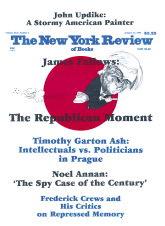In response to:
Leading with the Grumper from the August 11, 1994 issue
To the Editors:
Nicholson Baker’s virtuoso sampling of fuck entries and other gems in the Historical Dictionary of American Slang [NYR, August 11, 1994] brings to mind the unsuccessful attempt to introduce the “f-word” into standard American dictionaries more than three decades ago—almost a decade before the taboo was broken.
In the late 1950s Philip B. Gove, editor of Webster’s Third New International Dictionary, was convinced that a full description of the English vocabulary in the mid-twentieth century demanded the inclusion of fuck and many other taboo words in widespread use. Indeed, the step had been under consideration at the Merriam-Webster Company for some time, as well as by lexicographers elsewhere.
Gove’s papers include a galley proof covering the words “fuchsia” through “fuegian,” which shows that three entries were set in type—fuck as a verb and as a noun, and fuck up as a verb. Each entry was labeled “obscene and usu. unprintable.” Even with that warning, however, the words were too much for Gordon J. Gallan, the company president, who feared that the reputation of the company would be damaged. He ordered the “f-words” deleted—a rare if not unique overruling of Gove on an editorial decision. The other obscenities were left untouched, however, and critics who later noticed the obvious omission attacked Gove for timidity and inconsistency.
After he stepped down as editor-in-chief a few years later, Gove stayed on as a consultant, and at the request of his successor, H. Bosley Woolf, revised scatological entries for the eighth edition of Webster’s Collegiate and introduced additional ones, including fuck. But before this edition was published, the American Heritage Dictionary of 1969 became the first of the American standard dictionaries to break the taboo.
Herbert C. Morton
Bethesda, Maryland
This Issue
January 12, 1995



